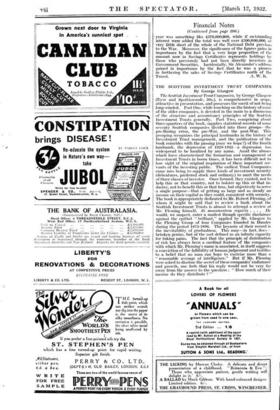The Scottish 'Investment Trust Companies, by George Glasgow (Eyre and
Spottiswoode, 50s.), is comprehensive in scope, attractive in presentation, and possesses the merit of not being long-winded. Part One, while touching on the history of some of the older companies, is devoted in the main to a discussion of the structure and accountancy principles of the Scottish Investment Trusts generally, Part Two, comprising about three-quarters of the book, supplies statistical records of sonic seventy Scottish companies divided into three groupsthe pre-Baring crisis, the pre-War, and the post-War. This grouping recognizes the principal landmarks in the history of Investment Trust management, and the publication of the book coincides with the passing (may we hope ?) of the fourth landmark, the depression of 1929-1932—a depression too widespread to be localized by any name. Amid the abuses which have characterized the formation and management of Investment Trusts in boom times, it has been difficult not to lose sight of the original inspiration of these important ser- vants of the investing public. The earliest Trust Companies came into being to supply three kinds of investment security (debentures, preferred stock and ordinary) to meet the needs of three classes of investor. Once formed, they existed, not to help this or that country, not to bolster up this or that in- dustry, not to benefit this or that firm, but objectively to serve • a single purpose—that of getting as large and as steady an income on their capital as they could, consistent with security. The book is appropriately dedicated to Mr. Robert Fleming, of whom it might be said that to review a book about the Scottish Investment Trusts is almost to attempt a review of Mr. Fleming himself. Si monumentunt requiris . . . . He would, we suspect, enter a modest though specific disclaimer against the epithet " brilliant," applied by Mr. Glasgow to the Fleming Group of four Companies founded in Dundee during the period 1873-1896. The keynote of their record is the inevitability of gradualness. This may—in fact, does— betoken genius, but of the sort defined as an infinite capacity for taking pains. The fact that the principle of distribution of risk has always been a cardinal feature of the companies with which Mr. Fleming's name is associated, in itself suggests a conviction of the fallibility of human judgement and testifies to a belief that no man can hope to exercise more than a " reasonable average of intelligence." But if Mr. Fleming were-asked to disclose the secret of these companies' endurance and growth, one feels that his reply would not be- very far away from the answer to the question : " How much of their income do they distribute "


















































 Previous page
Previous page